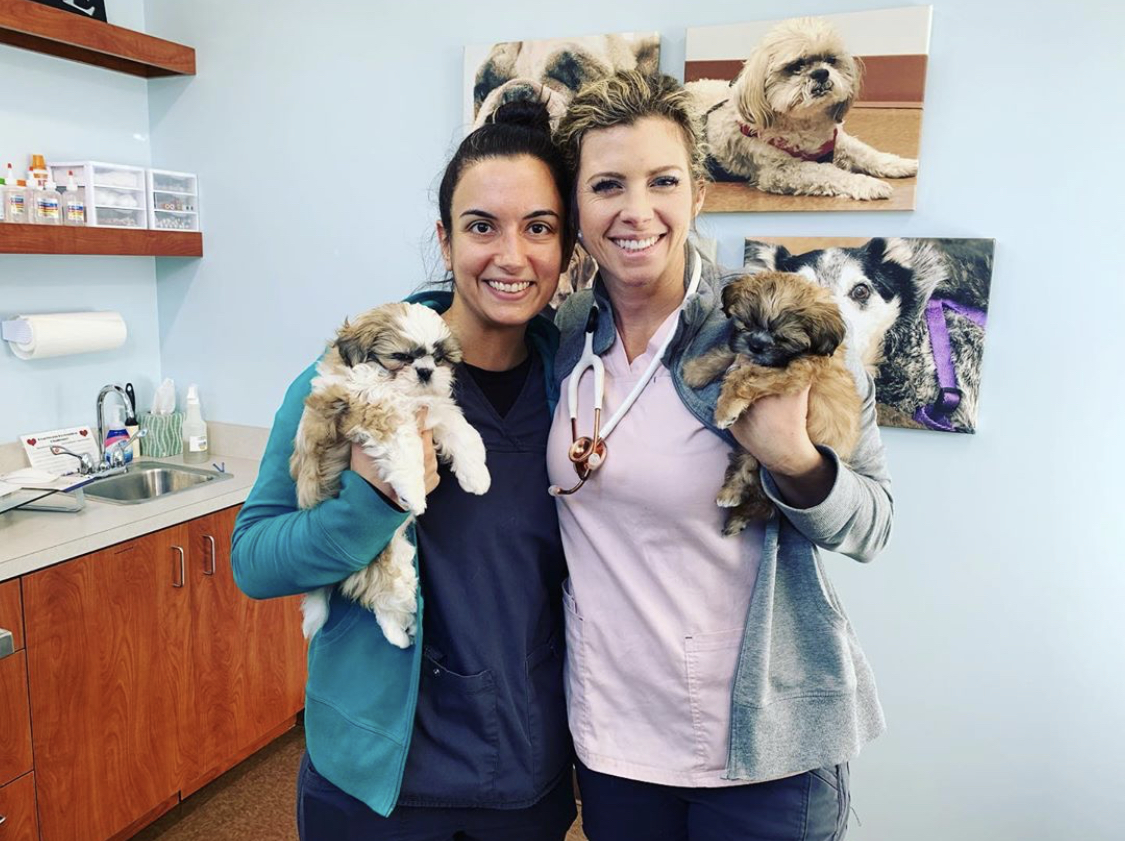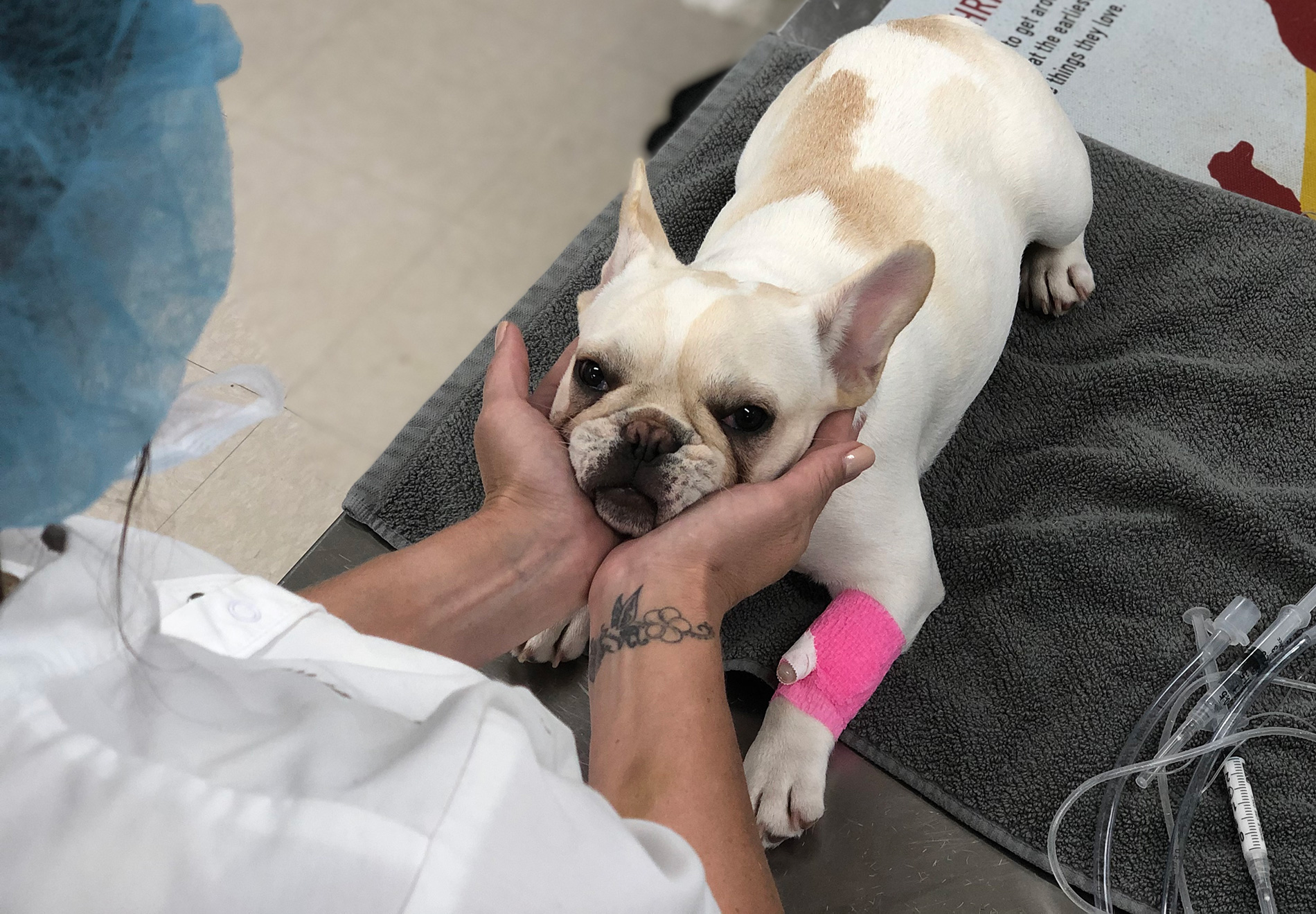Complete Care For Your Best Friend
We’re here to care for your pet when they need us most.
Compassionate veterinary care for the pets of Wilmington, NC and beyond.
When every second counts, we’ll be there. We utilize the latest technology and diagnostic equipment to make sure that we can find what’s wrong with your pet when it’s not obvious to the naked eye. Our knowledgeable staff and modern facilities are equipped to handle a wide variety of medical conditions, including emergencies. Because we can perform many diagnostic procedures in-house, we can often give you immediate answers and start treating your pet faster. In some cases, your pet may require hospitalization and further diagnostic tests. During those periods, we’ll be there to answer any and all questions you may have.
We are experienced in many aspects of internal medicine for dogs and cats, including but not limited to gastroenterology, neurology, dermatology and allergies, cardiology, oncology and cancer, orthopedics, and ophthalmology. We pride ourselves in working hard to find solutions for your pet so that you do not need to see a specialist, but when appropriate, we have a number of reliable specialists who will work with us to find answers for your pet.
Learn more about our veterinary services!
Click a link below to jump to that section
MEDICAL ASSESSMENT | MOBILITY & COMFORT | DERMATOLOGY (SKIN) | INTERNAL MEDICINE | ENDOCRINOLOGY (HORMONES) | NON-INVASIVE PROCEDURES | MICROCHIPPING

MEDICAL ASSESSMENT
We hope to see your pet at least once a year for a full nose-to-tail exam so that we can have a great baseline of their overall health over time. This information also helps us when they’re not feeling their best.
To ensure a proper diagnosis, we often need to examine your pet. We begin a medical assessment by looking at your pet’s eyes, ears, and skin and checking his or her cardiovascular, neurological, gastrointestinal, and skeletal systems for any abnormalities. We will perform blood and/or urine tests as necessary to check your pet’s kidneys, liver, pancreas, and endocrine system, including the thyroid and adrenal glands. Based on your pet’s condition, we may recommend further diagnostic tests, such as radiography (X-rays), endoscopy (internal scoping), ultrasound, or biopsy.
We are fully equipped to diagnose, treat, and help your pet get back to feeling their best.

Mobility & Comfort
Watching your pet in pain is never easy. We know the issue of pain management is of great concern to pet owners today. We have a variety of medications as well as natural remedies available to manage your pet’s pain, whether he/she has suffered from trauma, surgery, or arthritis. We specialize in acupuncture, spinal manipulation, laser, and physical therapy to restore your pet’s comfort and mobility. We would love to examine your pet and find the most effective treatments to help them move better and enjoy their lives.

Dermatology (Skin)
Depending on your pet’s symptoms and the results of our physical exam, we may recommend skin tests and/or bloodwork.
One of our specialties is using alternative therapies such as holistic nutrition and herbs to reduce itching and allergies and restore health and strength to both the skin and immune system. Please let us know if your pet is suffering from chronic skin and ear problems. We will utilize all options to get your pet relief.

Internal Medicine
Our commitment to internal medicine is really at the heart of what we do. We are problem solvers. We have complete access to diagnostic testing, both inside and outside our offices, utilizing the best technology for disease detection and prevention. We have years and years of experience seeing the most challenging diseases found in pets, and we are committed to providing the best care to your best friend! If ever we can’t find the answer, we will find someone who can.

Endocrinology (Hormones)
Identifying endocrine problems as early as possible is important in dogs and cats. These serious, potentially life-threatening conditions are much more manageable when caught early, allowing us to begin proper treatment.
The endocrine system is made up of a group of tissues (mostly glands) that release hormones into the bloodstream. These hormones regulate metabolism, growth, development, and reproduction and are dispersed to different areas of the body, depending on the hormone’s function. When a hormonal balance is disturbed (by a tumor or autoimmune disease, for instance), an endocrine disorder can develop. “Hyper” refers to an excess of hormone, and “hypo” refers to a deficiency in a hormone. Treatment varies depending on the disease.
Click to Continue Reading.
- Diabetes mellitus is caused by a deficiency in or resistance to the hormone insulin.
- Hypothyroidism, which is often diagnosed in dogs, indicates that the animal has low levels of thyroid hormone.
- Hyperthyroidism, which frequently affects cats, indicates that the animal has high levels of thyroid hormones.
- Addison’s disease (hypoadrenocorticism) and Cushing’s disease (hyperadrenocorticism) can also affect both species, although Cushing’s disease is rare in cats.
Contact us if your pet begins panting excessively, develops any skin issues (such as hair loss or dull coat), or shows any changes in behavior, energy levels, appetite, weight, water consumption, or urination.

Non-Invasive Procedures
We prefer to cause as little harm and side effects to our pet patients, which is why we offer non-invasive treatments for arthritis and ligament tears. ACL tear have become an epidemic in dogs, which is frustrating and expensive. Many of our offices also provide ultrasonography for internal medicine problems such as liver and kidney disease, cancer detection, and heart problems.

Microchipping
According to PetFinder, over 10 million pets go missing every year, and one in three pets will go missing at some point in their life. Imagine if your dog or cat got lost. You’d want to give him or her the best chance of getting home. With microchipping, you can.
Microchipping is a safe, permanent way to identify your pet in case he or she becomes lost. A microchip, which is a tiny device about the size and shape of a grain of rice, is placed just under the loose skin at the back of the neck. When a lost dog or cat without an ID tag is found, a veterinarian or veterinary technician will use a handheld microchip scanner to check for a chip. If the pet has one, it will transmit its ID number to the scanner via a low-frequency radio wave. The veterinary hospital or shelter then calls the chip manufacturer, retrieves the pet owner’s contact information, and calls the owner.
Click to Continue Reading.
We recommend that you use a microchip, along with a collar and ID tag, to identify your pet. An ID tag is still a reliable identification method. Pets that have tags with current contact information are more likely to not end up in shelters and tend to get home faster than those without tags. However, collars and ID tags aren’t permanent and can be removed (overnight or for grooming); pets can also lose them. With a microchip, your pet will have a much better chance of being identified and returned to you. Pets without microchips that end up in shelters may be adopted out to another family or even euthanized.
Please contact us to schedule an appointment to microchip your pet. Although we hope your pet never becomes lost, we want you to be prepared. We can also suggest a plan to have in place so if your pet does go missing, you’ll be able to act quickly.
We can microchip ferrets, rabbits, birds, and other companion animals, too!
Ready for a visit?
Call us directly at 910-444-0420 to request an appointment!
